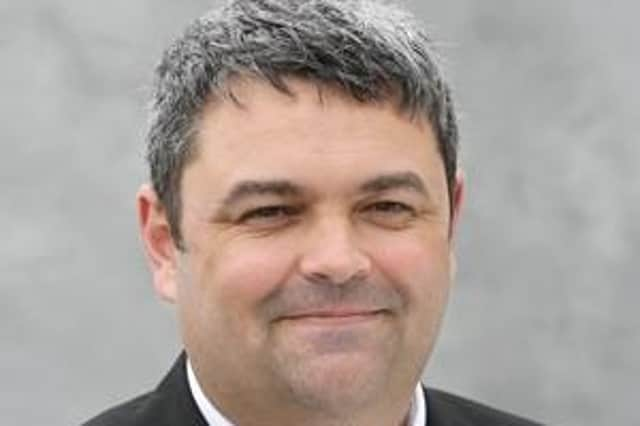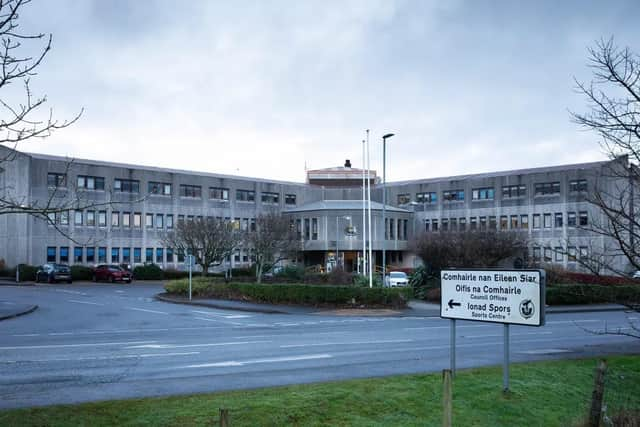Leading the annual struggle to make ends meet


He is the first Leader to live south of the Sound of Harris and grew up in Askernish. A media studies graduate, his previous employment covered what he describes as “the usual island mix” which ranged in his case from Gaelic media to fish farming.
Well known in South Uist for his community activity, particularly working with young people through sport, he was also clerk to Lochboisdale Community Council. In 2017, he stood for the ward which included Barra as well as Eriskay and South Uist. In a crowded field, he was elected on the eighth count.
Advertisement
Hide AdAdvertisement
Hide AdFive years later in a ward that no longer included Barra, he topped the poll, having confirmed a reputation within the community for hard work and commitment to local issues. In Stornoway by then, he had risen quickly within the Comhairle hierarchy and by 2021 was chair of the education and children's services committee.


With Roddie Mackay retiring from the Comhairle, Paul was an obvious successor – articulate and well versed in the complexities of local government. As Leader, his main job so far has been to steer the Comhairle through its perennial funding challenges.
Indeed, who would want to be a councillor in current circumstances? Once upon a time it was possible to envisage real progress for local communities, to deliver bold projects, to invest in the future. There were golden ages when schools were built and services expanded. But now?
Again this week, Comhairle nan Eilean Siar had to face up to this when they confirmed their budget for the coming year – a miserable task involving £1.7 million of cuts despite using almost half their remaining reserves to keep the show on the road.
Advertisement
Hide AdAdvertisement
Hide AdAs evidence that every cloud does indeed have a silver lining, high interest rates produced a million quid on the loan to Stornoway Port Authority for the new harbour facilities. That took away some of the pain and allowed for production of a balanced budget.


When it came to treatment by government, there was no sign of silver linings and Paul Steele did not mince his words when he presented the budget. Their attitude towards local democracy is “wholly unacceptable” and threatening to the cohesion of society, he said. As for “island-proofing”, the absence of it is “woeful”.
When again, Paul Steel wondered, will a council leader be able to use words like “invest, improve, support and increase” when presenting an annual budget Instead of “service reductions and cuts”?
He paid tribute to the people who work for the Comhairle: “I’m amazed our officers were able to put a budget in front of us at all given how much of our records were affected by the cyber attack”.
Advertisement
Hide AdAdvertisement
Hide AdThe recovery process has involved a huge amount of additional effort for officers as each department worked overtime to retrieve the lost ledgers.
In advance of this week’s meeting, he told the Gazette: “Every year since I have been a councillor, we have been looking at savings or efficiencies or cuts – whatever you want to call them”. But he was proud of the outcome in very difficult circumstances.
“It was quite a good budgetary process” he said. “We did a deep dive into all the budget lines.
"Unlike many Scottish councils, we have again been able to avoid compulsory redundancies and to protect services but at the end of the day, we are limited In what we can do”.
Advertisement
Hide AdAdvertisement
Hide AdEven in the short term, protecting jobs and services comes at an unsustainable cost. The Comhairle currently has £4.2 million left in reserves and committing £2 million in the coming year means the same thing can only happen one more time before they are completely skint.
It’s not just financial cuts that make life difficult but also the very high degree of ring-fencing by Edinburgh, restricting the options available to the comhairle.
That was going on right up to the wire this week with a threat from the Scottish Government’s Finance Secretary, Shona Robison, to take away money from councils if they do not maintain teacher numbers.
The Comhairle budget, which was the product of six months of anguished seminars involving councillors and officials, includes a significant saving on staff costs across primary and secondary schools, as part of a £1 million cut to the education budget. By the time Ms Robison delivered her ultimatum last week, it was too late to overturn that element of their conclusions.
Advertisement
Hide AdAdvertisement
Hide Ad“If we don’t maintain teacher numbers”, says Paul Steele, “we don’t get the money. So if she sticks to that line, we will have to find cuts elsewhere – after our budget process has concluded. It’s not a very sensible way to manage things”.
The teachers issue is being contested at national level by the Convention of Scottish Local Authorities in which Paul Steele is playing an increasingly prominent role.
He recently became leader of the Independent Group within CoSLA, which essentially means the three islands authorities.
He says that he had been encouraged by the Verity House Agreement which the Scottish Government and CoSLA solemnly signed in June last year.
Advertisement
Hide AdAdvertisement
Hide AdHopes were pinned on this being a big step towards a more constructive relationship between the two tiers of government after a decade of funding cuts and increasingly centralised control in Edinburgh.
The key maxim in the Agreement was “local by default, national by agreement”. In other words, the norm should be for councils to “address challenges in a manner which best suits local needs”.
In practice, Paul says, the opposite continues to be the prevailing reality as exemplified by the late intervention over teacher numbers that he described.
Another huge disappointment has been the treatment of revenue which went to the Scottish Government from ScotWind licences, with “national” again prevailing over “local”.
Advertisement
Hide AdAdvertisement
Hide AdExpectations were that this money would support councils in the front line of offshore wind developments were dashed when all £700 million went into the Scottish Government’s own coffers – and didn’t come out again.
Paul Steele points out that the Comhairle already has a backlog of £50-60 million in road repairs.
“If everything planned goes ahead, we are going to need a massive investment in infrastructure, but we just don’t have the money," he said. “That is what I expected the ScotWind money to be used for, according to local needs”.
A wider perspective
The problems do not end with the Comhairle. The Western Isles NHS Board also faces funding challenges while the Integrated Joint Board that brings the two together to provide social care is struggling to set a budget. A 40 per cent increase in care home costs is one likely consequence.
Advertisement
Hide AdAdvertisement
Hide AdPaul says that he held a number of public meetings across the islands during the budget process and “asked the public what areas of services they wanted to protect. Social care came out high on that list of priorities”. Accordingly, the Comhaire has maintained the same funding levels in cash terms but that, of course, does not make any allowance for inflation.
His work within CoSLA has given him a valuable insight into the bigger picture of local government and the need for fundamental reform if the whole system is not going to erode to the point at which it is unable to protect communities and the most vulnerable within them.
And then, of course, there is transport. “Being the council leader from outside Lewis means a lot of time away from home”, Paul says, “but you get to know a lot of people who are experiencing the transport difficulties at first hand”.
It’s vital, he says, for local authorities to be represented on the board of Calmac and other decision-making bodies. “There’s nobody who knows island transport better than Uisdean Robertson. He can speak to them and plead with them but is never in the room when the decisions are taken which affect people in these islands. How can that be justified?”.
Advertisement
Hide AdAdvertisement
Hide AdOne of the possible cuts to non-statutory services that was avoided during the budget process was to the inter-island Loganair service ,diminished though it already is. Because it is within the council area, it does not qualify for PSO status and subsidy that goes with it, so it costs the Comhairle around £400,000 a year.
Paul points out: “90 per cent of the people who use it are going to hospital appointments”. So where, on any sensible calculation, would the saving be in removing the service – which is what would happen if the Comhairle stopped subsidising it?
Maybe because he has only been in the Leader’s role for two years, he is still driven by the potential for local government to deliver so much more, if only it was given the latitude to do so. He keeps coming back to the “local by default” principle and freedom to make decisions they were elected to make.
“Instead of having to go back to government constantly, explaining and justifying, why not devolve the power to make decisions and spend according to local priorities, for example on housing?”, he asks. Even with no more money, it would lead to better results.
Advertisement
Hide AdAdvertisement
Hide AdLift your eyes and see what is possible, Paul Steele seemed to suggest on Tuesday. “There are numerous examples of empowered local authorities throughout western Europe funded in a manner that respects their work, their aspirations and their legal duties”.
Back in the real world of Scottish local government, his summary was all too familiar: “These are not efficiency savings. These are service reductions”.